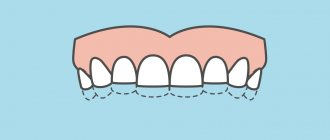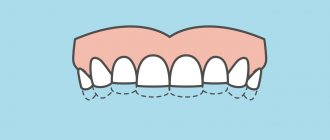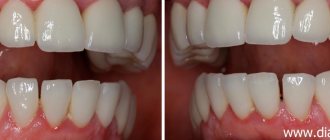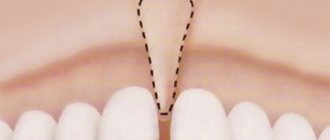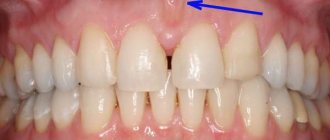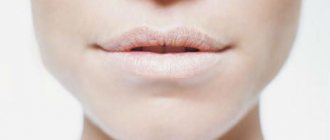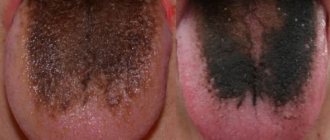Chewing or grinding of teeth in a child
Chewing or smacking in sleep is an uncontrolled contraction of the oral masticatory muscles, accompanied by a sharp clenching of the jaws, grinding of teeth, smacking, excessive salivation, creaking and other symptoms. In medicine, this problem is called “bruxism.”
The period of time during which a person chews can range from a few seconds to 5-10 minutes. Typically, during the entire sleep phase, several episodes of pathology can be noticed. If one episode lasts more than 15 seconds, cracks and chips in the teeth and soft tissue injuries may occur.
Experts have linked a variety of slurping sounds, chewing, and teeth grinding to other sleep disorders. They accompany somnambulism, snoring, urinary incontinence at night, and the occurrence of nightmares. The popular version attributes the symptoms of bruxism to infection with worms. However, in reality, night sounds of teeth and the presence of parasites in the body are in no way connected.
Most often, manifestations of bruxism, when a person periodically swallows saliva, grinds teeth, smacks or chews, are associated with psycho-emotional disorders, for example, depression, stress, mental overload. Excessively active activities before bedtime, overexcitation, growing internal anxiety, and general tension provoke restless sleep.
If the episodes last no more than 10 seconds and occur 1-2 times per night, then this may not indicate any disease, but simply be an individual feature.
This is especially true for young children, who are often subject to reflexes, and chewing at night is a kind of continuation of the sucking instinct or may indicate the child’s hunger.
Diagnostic methods
Diagnosis of bruxism involves studying the patient’s complaints, as well as assessing indirect signs based on the results of a routine visual examination. The leading method of objective diagnosis is the use of Brux Checkers - special mouthguards that are made on the basis of a plaster cast of the patient’s jaw. These aligners allow the detection of occlusal obstructions. The doctor issues brux checkers to wear overnight, after which the patient submits them to the clinic for analysis. Using diagnostic aligners, a specialist determines which teeth bear the greatest load.
Electromyography and polysomnography methods make it possible to register the pathological activity of the masticatory muscles and confirm the diagnosis of bruxism.
But, as a rule, it is possible to understand the reasons only with the help of comprehensive diagnostics. So, in the case of bruxism in adults, psychosomatics may occur, so consultation with a psychologist or psychotherapist will be required.
Reasons for chewing in your sleep
A person chews in his sleep for several reasons:
- Features of the psyche of young children. Children handle emotional stress and stress differently. Even some positive emotions, but excessive ones, can manifest themselves as nighttime symptoms of bruxism. In this case, the child should be shown to a neurologist to exclude possible pathologies of the central nervous system.
- Teething or changing milk teeth to molars . This process is often accompanied by discomfort, pain, and itching. A sleeping baby literally wants to scratch his gums, but does not control himself in his sleep, so he chews or grinds his teeth.
- Various orthodontic pathologies - malocclusion, diseases of the jaw joints, abnormal structure - can lead to the fact that the baby seems to chew food not only in his sleep, but also during daylight hours.
- Another reason why people suffer from bruxism is heredity . The risk of its manifestation in children increases if a similar pathology is observed in one of the parents.
- Nightmarish dreams. Too much stress during a night's rest can cause unconscious movements of various muscles, which is manifested not only by grinding, but also by moving the tongue in sleep, twitching of the arms and legs, blinking, and tics.
- Nasal congestion , enlarged adenoids and other disturbances in normal breathing cause anxiety and overly active work of the facial muscles.
- Manifestations of bruxism are accompanied by a deficiency of magnesium, calcium, amino acids and B vitamins, which affect the functioning of the central nervous system and muscles.
- Insufficient development of jaw muscles . A newborn baby must be fed only with milk or formula, and from 6 months it is necessary to introduce complementary foods, constantly changing the structure of dishes. If a child primarily eats pureed or blended food, the jaw muscles do not work. If there is no load, grinding or chewing may occur during sleep.
In the presence of helminths, it is indeed possible that such a symptom may occur, but it is not caused by the presence of parasites as such, but by general discomfort in the body, intoxication, which makes sleep restless and intermittent.
The baby smacks his lips when feeding. Why does a child smack his lips and should he be concerned?
It is always difficult at first for new parents to understand what their baby wants from them. As a rule, they just start trying everything in turn: changing the diaper, feeding the baby, helping him burp, putting him to bed. But if you know about simple baby signals and their meaning, it will be much easier for you to calm your baby, and he will be much less fussy. Next we will talk about how babies behave, what signals they give to us adults when they are hungry, tired or want to play.
If the child is hungry
If your baby is hungry and crying, it means that the stage when he wanted to eat and tried to tell you about it has long passed. It is much easier to feed a slightly hungry child who is still calm than one who is already fussy about it. Expect signals from a newborn that he is hungry every 1-2 hours, from a slightly older child - every 3-4 hours. Here are what these signals usually look like: Yawns, opens mouth;
Smacks lips or makes sucking noises;
Puts his fist in his mouth;
Moves eyes quickly in sleep;
Most babies use the same signals, so once you know what to look for, you'll know when your baby is telling you he's hungry.
If the child is tired and wants to sleep
It's easy to tell when your baby is tired and sleepy at first because babies typically eat and then fall asleep. However, as children get older, they may stay awake longer, making it harder to determine whether they are sleepy. Some babies follow a schedule and sleep at almost the same time every day. Others don’t, and then mom and dad must understand when the child gets tired. You can do this by the following signs: Rubbing your eyes or yawning;
Ignores your attempts to distract him.
It is important that when your baby starts to show signs that he is tired and wants to sleep, you react quickly, as an overtired baby will be much more difficult to put to sleep.
If the child wants to play
Believe it or not, there will be times when your baby will need nothing more than your attention. By paying attention to your child from a very early age, you will help him quickly learn how to behave correctly in adulthood - in a word, make the upbringing process easier for yourself. Here are some signals that may indicate that a child wants to play: Freezes when looked at;
Looks carefully at your face, looks into your eyes;
Opens his eyes wide and carefully follows your movements;
Give your child attention by getting down to his level and playing with toys or reading a book. If you are currently busy with something (for example, preparing dinner), give your baby attention by telling him what you are doing or responding to how he plays or what he does.
All parents want to provide their baby with the best. In the online store parado.com.ua you can buy high-quality and incredibly beautiful clothes for your child. There is literally everything here: from tiny socks to
New sounds that a baby makes are always a reason for joy for every mother. But if the baby clicks during feeding, this may indicate frenulum defects and improper attachment to the breast. This behavior of the baby alarms many women, especially if he behaves restlessly at this time.
Treatment
Smacking in your sleep is not considered a pathology and does not threaten your health. Rather, this problem is not the sleeper himself, but his environment. There are several secrets that will help solve the problem of teeth movement and grinding:
- Try to organize your child’s activities in such a way that he does not experience too strong emotions, including positive ones. Protect him from stress, family quarrels, too active evening games, cartoons and computer games with a scary plot.
- If a child slurps regularly and often (more than 5-7 episodes per night), show him to specialists - a pediatrician, neurologist, somnologist. The cause of night grinding in adolescents may be vegetative-vascular disorders, which are accompanied by headaches and fluctuations in blood pressure.
- It is also necessary to exclude the viral load on the body and check for worms. If, in addition to manifestations of bruxism, the child is pale, inactive, has a disturbance in appetite and bowel movements, basic tests - urine and blood - will be required.
- Sometimes children chew because of an uncomfortable bed, scratchy bedding, stale dry air, or high temperature in the bedroom. Be sure to ventilate before going to bed, adjust the humidity to 50–70%.
- You can come up with evening rituals that will help your baby calm down faster. Swimming, listening to audio books, fairy tales, and some calm games, such as board games, are suitable.
If such symptoms are caused by a pathological condition or some disease, medications are selected only by a doctor. If a pathology is diagnosed, treatment will not be aimed at eliminating grinding or chewing, but at the root cause.
Help with panic attacks
A person suffering from panic attacks at night cannot correctly assess his condition. Often waking up with a feeling of fear and anxiety is perceived as an ordinary nightmare, so they are in no hurry to seek help. But such episodes are becoming more frequent, and my health is getting worse. If panic attacks occur during sleep, treatment should only be prescribed by a psychiatrist or psychotherapist. At the initial consultation, the doctor collects an anamnesis. Only sincere answers and a confidential conversation with a doctor will help you make a correct diagnosis and choose the optimal therapy. The main goal of conversations with a doctor is to learn to quickly recognize your panic attack and, over time, learn to cope with it, learn to help yourself, gain personal experience of successfully overcoming, coping, and thereby minimize the risk of its reoccurrence.
For a sleep panic attack, symptoms and treatment vary. With a high level of anxiety, as well as with severe or frequent attacks, a course of anti-anxiety (anxiolytic) drugs has a good effect. Medicines are selected individually, and only with the consent of the patient.
If a panic attack occurs in a dream, how to deal with it without pills?
At the onset of the disease, relaxation and muscle relaxation techniques help to quickly calm down and normalize the nervous system. This is taught in psychotherapy sessions. Breathing techniques, therapeutic hypnosis, and cognitive behavioral psychotherapy are also effectively used.
Individual and then group psychotherapy is an important stage in the treatment of panic attacks. A person needs to figure it out and understand what makes up his individual causes of anxiety attacks during the daytime. Learn to respond adequately to various stressful situations. Find your own individual regimen that makes up a healthy lifestyle, strictly follow the recommendations of your doctor. Only in this case will the prognosis be favorable.
Short bridle
If your baby clicks his tongue while bottle feeding or breastfeeding, this may indicate a short frenulum. This is the name given to the physiological feature when the frenulum is attached to the edge of the tongue. This causes incorrect grip, because the baby’s tongue movements are limited. For these children, it takes a little longer to get full and they begin to lose weight.
Only a highly qualified pediatric dentist can tell whether a child’s frenulum is short or long. If it is short and not elastic, the doctor suggests trimming it. This procedure is performed in a dentist's office for a short time. You do not have to go to the hospital with your child, since after the procedure you can go home straight away.
In the first days of his life, the baby sucks up to 30 ml of milk. While he eats, he learns to distribute his breathing, control the entire process, tries to swallow and suck correctly. However, all this is quite complicated and the child swallows air when feeding from a bottle, which accumulates in the ventricle and causes pain.
Prevention
The most important preventive measure against wasp bites is not to cause aggression through sudden movements when an insect approaches. If a wasp is chasing you, you need to stop in one place and not move. If possible, avoid sweet treats in nature; wasps flock to tasty smells.
When going on vacation, pay attention to appearance and aroma: excessively bright clothes decorated with rhinestones and sequins will undoubtedly attract the attention of winged ones; the smell of perfume can cause aggression. You should avoid places where wasps gather in large numbers and do not touch the hives. If your body is overly sensitive to insect bites, carry anti-allergy medications in your purse.

